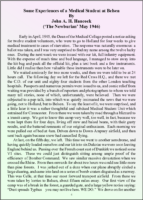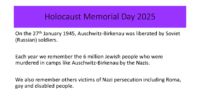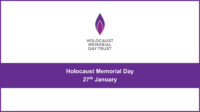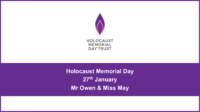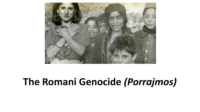The Beacon School Programme
Towards the end of 2023, St Bart’s was selected to take part in the Beacon School Programme, which is an initiative of the UCL Centre for Holocaust Education. As the Holocaust moves away from living memory and with the rise of Holocaust deniers and those who distort this history, it is important that we do all we can to preserve the memory of those who fell victim to the Nazis and their collaborators.
Programme Updates
Former student’s first-hand account of the Liberation of Bergen-Belsen
2025 marked the 80th anniversary of the Liberation of Bergen-Belsen by British forces on 15 April 1945.
Bergen-Belsen, one of Nazi Germany’s infamous concentration camps, was first established in 1940 as a prisoner of war camp, near the city of Celle in Lower Saxony. From 1943, Jewish civilians with foreign passports were held there as ‘leverage’ in possible exchanges for Germans interned in Allied countries or for money. It later became a concentration camp and was used as a collection centre for survivors of the death marches. The camp became exceptionally overcrowded and, as a result of neglect, conditions were allowed to deteriorate further in the last months of the war, causing many more deaths.
Liberating the camp involved serious challenges in stabilising conditions in the camp and implementing a medical response to the crisis. As the British Army began to organise the relief effort, John A.H. Hancock was training at a London Teaching Hospital and found himself part of a group of student volunteers on their way to Bergen-Belsen. A former St Bart’s student, who had recently graduated in 1943, John wrote a deeply moving and harrowing article of his experiences at Bergen-Belsen for the school newsletter, The Newburian, in May 1946.
Visit from Voices of the Holocaust
On Monday 10 February 2025 St Bartholomew’s School was visited by Voices of the Holocaust, a critically acclaimed theatre company dedicated to preserving the memories and stories of Holocaust survivors. Their play ‘Kindness: A legacy of the Holocaust’ is largely a verbatim play based on the testimony of Hungarian survivor Susan Pollack OBE, aged only 13 when she was sent to the notorious Auschwitz-Birkenau in the summer of 1944. Kindness has been described as “beautiful and empowering” and “compelling and emotive”. Following the Year 9 performance, Voices’ actors and the play’s director, Cate Hollis, held a workshop with our A Level Drama & Theatre Studies students. After school, a second performance of ‘Kindness: A legacy of the Holocaust’ was held for parents, carers and students from other years.
Beacon School Programme Objectives
The Beacon School Programme aims to deepen the historical knowledge and understanding of the Holocaust, through a developed focus in KS3 History. It is also hoped that the programme will enable students to tackle misinformation and combat claims made by those who wish to misrepresent the Holocaust.
Since embarking on this journey, St Bart’s has already made strides to achieve the aims of the project, these include:
-
- A developed KS3 History focus, utilising the support and guidance of leading academics in the field of Holocaust education
- The appointment of three Year 12 Beacon Captains, who interviewed Dan Stone (Professor of Modern History at Royal Holloway), as part of a new podcast series open to all students, and four Year 9 Beacon Captains.
- An improved series of targeted assemblies for all students (Year 7-13) in the lead up to Holocaust Memorial Day. These have focused on a range of Holocaust related topics including the Diary of Anne Frank (Year 7 & 8), defining the Holocaust (Year 9-11), forced labour (Year 12) and the Roma and Sinti genocide (Year 13)
- A Holocaust focused trip to Krakow, which is offered to Year 12, focused on pre-war Jewish life, the rise of antisemitism and the implications of the ‘Final Solution’
Programme Development
Some of our plans for 2024/2025 are to continue to improve the knowledge and understanding that our students have of the Holocaust through:
- The creation of an exhibition at St Bart’s, which will be open to students, staff and the immediate community and will be supported by the Wiener Library in London
- Establishing greater links to our local primary schools, with support of our Beacon Captains, with the aim of contributing towards PSHE curriculums
- Continued development of our Personal Development Programme offer, with the aim of improving a whole school approach in improving Holocaust education
- Working towards achieving our ‘quality mark’, which is awarded by UCL
Holocaust Memorial Day
This year (Monday 27 January) marked the 80th anniversary of the liberation of Auschwitz-Birkenau. Auschwitz has become a global symbol of terror, genocide and the Shoah (known commonly as the Holocaust). Initially, Auschwitz was set up as a concentration camp for many people who were persecuted by the Nazis and their collaborators. In 1942, it also became the site of extermination, where over 1 million Jewish adults and children were murdered. In addition to Auschwitz, many other camps were set up across Europe to eradicate European Jewry.
On Holocaust Memorial Day, we remembered the many millions of lives that were lost during the Holocaust, whilst also remembering other victims of the Nazis and their collaborators. Mr Owen, Miss May and our student Beacon Captains, spoke during a series of assemblies on the importance of remembering the Holocaust.
Our commitment is to deepen and to secure the knowledge of our students. If you would like any further information or if you would like to get involved, please contact Mr Owen (Social Sciences) or Miss May (Humanities).
